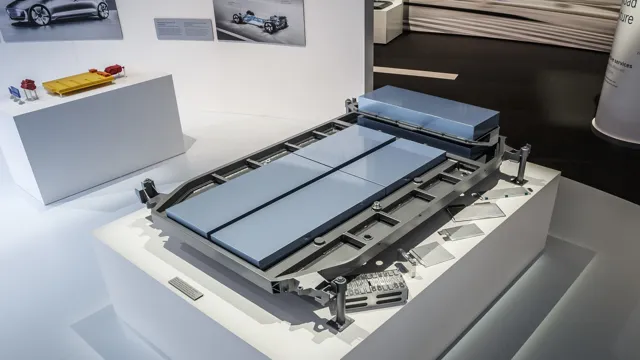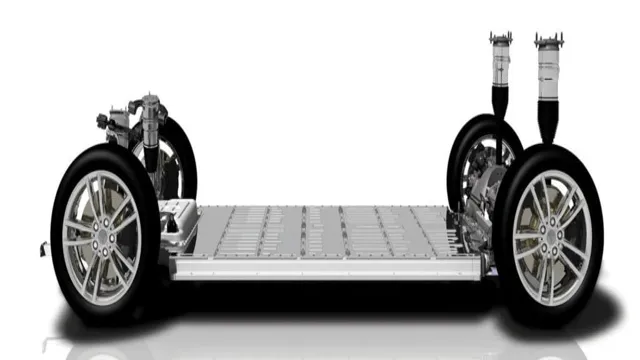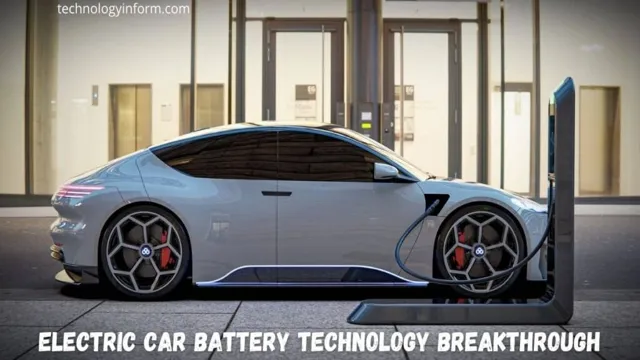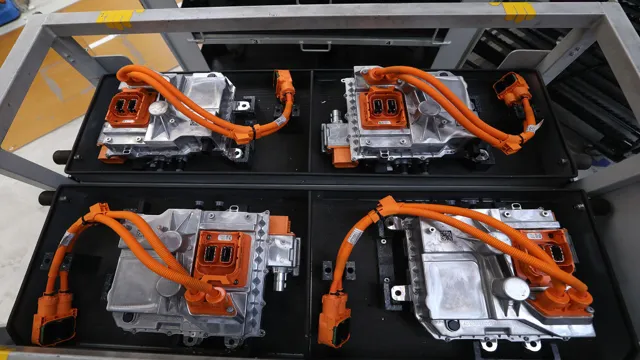Revving Up Your Ride with Electric Car Batteries: A Guide to Powering Your Vehicle Efficiently
Electric cars have been steadily growing in popularity in recent years due to their numerous benefits for both the environment and individuals. One of the key components that makes electric cars possible is the battery. But, have you ever considered the true power of these batteries? Electric car batteries are not just a source of energy for the vehicle, but they also have the potential to transform the way we use and store energy.
These batteries are powerful enough to not only power a car, but also to power homes and businesses. Imagine being able to power your entire home with a single battery that is charged by your electric car. This technology has the potential to revolutionize the energy industry by allowing individuals to become more self-sufficient and less reliant on traditional power grids.
It also has the potential to reduce overall energy costs and promote a more sustainable way of living. But, the power of electric car batteries doesn’t just stop at energy storage. They also have the potential to reshape transportation as we know it.
Faster charging times and increased battery range are already transforming the way we use electric cars, making them more practical for everyday use. In conclusion, the power of electric car batteries goes far beyond just powering a vehicle. It has the potential to transform the energy industry and transportation as we know it.
As technology continues to evolve, we can only imagine the endless possibilities that electric car batteries will bring.
What Makes an Electric Car Battery Different?
Electric car batteries are different from regular car batteries in several ways. One key difference is that electric car batteries must be able to store a much larger amount of energy to power the vehicle. They also need to be efficient at discharging that energy quickly when the car is in use.
Additionally, electric car batteries use different types of chemicals than traditional car batteries. Lithium-ion batteries are the most common type used in electric cars because they offer a high energy density, meaning they can store a lot of energy in a small space. They are also able to be recharged quickly, which is important for electric vehicle owners who need to be able to charge their car in a short amount of time.
While electric car batteries are more complex than traditional car batteries, they are integral to the success of electric vehicles and the ongoing effort to reduce our reliance on fossil fuels.
Higher Voltage and Power Density
One of the main differences between electric car batteries and traditional gasoline vehicle batteries is their higher voltage and power density. Electric car batteries need to store enough energy to power the vehicle for long distances, making them much larger and more powerful than traditional car batteries. This higher voltage and power density allow electric vehicles to travel farther without needing to recharge and can offer a more responsive driving experience.
Think of it like a marathon runner needing better endurance and strength training to endure a longer race. This aspect is critical for the long-term success of electric car adoption, as it provides the power needed to meet daily driving needs and continue to push the technology forward. Electric car batteries continue to evolve, with continued investment in research and development driving even higher voltage and power density to further improve performance and range.
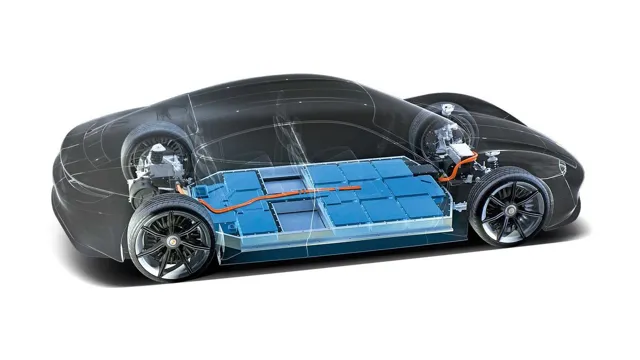
Regenerative Braking
Electric Car Battery When it comes to electric cars, the battery is the heart of the vehicle. Unlike a regular car battery, an electric car battery is rechargeable and is designed to provide power to the motor that drives the car. One of the key differences in an electric car battery is its regenerative braking technology, which is used to convert the kinetic energy generated by the car’s brakes into electrical energy that can be used to recharge the battery.
This not only increases the battery’s overall lifespan, but it also helps to reduce energy consumption and improve fuel efficiency. Additionally, electric car batteries tend to have a larger capacity and require less maintenance than traditional batteries. While they are more expensive upfront, the long-term savings on fuel costs and maintenance make them a viable and sustainable option for environmentally-conscious drivers.
Lithium-Ion Technology
When it comes to electric cars, the battery is the heart of the vehicle. Unlike traditional cars that rely on gasoline or diesel fuel, electric cars are powered by lithium-ion batteries. These batteries provide a range of benefits that make them ideal for electric vehicles.
For starters, they offer a higher energy density, meaning they can store more energy in a smaller space. Lithium-ion batteries also have a longer lifespan than other types of batteries, and they don’t suffer from a “memory effect” that can reduce their overall capacity over time. Additionally, they are more reliable and less prone to catching fire or exploding than other types of batteries.
Overall, the technology behind lithium-ion batteries is what makes electric cars feasible and practical for everyday use. With ongoing research and development, we can expect to see even more improvements in this area, leading to even more efficient and reliable electric cars in the future.
Benefits of Choosing an Electric Car Battery
Car battery electric vehicles are growing in popularity, and for good reason. They offer a number of benefits over traditional gas-powered cars. One of the primary benefits is increased efficiency.
Electric cars are more efficient because they don’t rely on combustion processes to convert energy into motion. Instead, they use batteries to store and release energy, which is much more efficient and environmentally friendly. Another benefit of electric cars is their low operating cost.
Electric cars are much cheaper to operate than traditional cars because they require less maintenance and don’t need expensive gasoline or oil changes. And finally, electric cars are better for the environment. They emit less pollution than gas-powered vehicles, so they are much cleaner and more sustainable.
Overall, car battery electric vehicles are a smart choice for anyone looking to reduce their carbon footprint and save money on operating costs.
Environmental Impact
When it comes to choosing a car, opting for an electric vehicle (EV) battery can be a wise choice for the environment. One of the main benefits of an electric car battery is that it produces zero emissions. This means that there are no greenhouse gases or harmful pollutants being released into the air.
This is particularly important as transportation is a major contributor to air pollution and climate change. Additionally, electric car batteries are much more energy-efficient. They generally use about 60% of the energy that traditional combustion engine cars use to cover the same distance.
This helps to reduce reliance on fossil fuels and can save drivers money on fuel costs in the long run. Plus, with advancements in EV battery technology, electric cars are becoming more affordable and accessible to a wider range of consumers. So, if you want to make a positive impact on the environment and your wallet, choosing an electric car battery is definitely worth considering.
Lower Cost of Ownership
Electric car batteries have been gaining popularity lately, and for many good reasons. One of the most notable reasons being their lower cost of ownership. While electric cars may have a higher upfront cost than gasoline-powered vehicles, the cost of fueling and maintaining an electric car over its lifetime is significantly lower.
This is largely due to the fact that electric cars have fewer moving parts than gas cars, which translates to lower maintenance costs and fewer repair needs. Additionally, charging an electric car is typically cheaper than fueling a gas car, especially as more and more charging stations become available. With lower annual operating costs and the potential for tax credits and other incentives, choosing an electric car battery can prove to be a smart financial decision in the long run.
Improved Performance
When it comes to electric cars, one of the most significant benefits of opting for an electric car battery is improved performance. Unlike traditional vehicles that rely on gasoline, electric cars are powered by electricity, which offers several advantages. For starters, electric car batteries are incredibly efficient, providing instant torque and acceleration that can outpace many gas-powered cars.
Additionally, electric car batteries are far more reliable than gasoline engines since they have less moving parts and require less maintenance. Furthermore, electric car batteries don’t produce any emissions, which not only benefits the environment but also reduces noise pollution. All in all, choosing an electric car battery can deliver significant improvements in performance and reliability while also helping the planet.
So why not make the switch today and experience the benefits for yourself?
How to Choose the Right Electric Car Battery
When it comes to choosing the right electric car battery, there are several factors to consider. One of the most important things to look at is the range that the battery can provide. The range is the distance that the car can travel on a single charge, and it’s essential to choose a battery that can meet your needs.
Another crucial factor to consider is the battery’s capacity, which is the amount of energy it can store. A higher capacity battery will generally allow for longer ranges, but it’s important to keep in mind that these can be more expensive. Finally, it’s essential to consider the overall performance and durability of the battery.
Choosing a high-quality battery from a reputable manufacturer will ensure that you get the most out of your electric car experience. So, when it comes to choosing the right car battery electric, make sure you do your research and choose the right one to meet your needs.
Consider Vehicle Range Needs
When it comes to choosing the right electric car battery, one important factor to consider is the vehicle’s range needs. This means thinking about how far you typically drive and how often you need to recharge your car. If you primarily use your car for commuting short distances, a battery with a lower range might be sufficient.
However, if you frequently take longer road trips or have a longer commute, you’ll want to opt for a battery with a higher range. It’s also important to remember that different electric car models will have different battery capacities, so be sure to take that into account when making your decision. Ultimately, choosing the right electric car battery is all about finding the best balance between range and affordability, so don’t be afraid to do your research and compare different options before making a final decision.
Evaluate Charging Infrastructure
Choosing the right electric car battery is an essential step in ensuring that your vehicle performs reliably and efficiently. When evaluating different electric car batteries, there are several factors to consider. Firstly, you want to ensure that the battery has enough capacity to meet your driving needs.
This will depend on your regular travel distance and the availability of charging stations along your routes. Additionally, you should evaluate the battery’s charging time, as this can vary significantly between models. It’s also crucial to consider the overall lifespan and maintenance requirements of the battery, as this will impact the long-term costs of owning an electric vehicle.
Another vital aspect to keep in mind is the type of charging infrastructure that you have access to. Choosing an electric car battery that is compatible with your preferred charging options, such as Level 1 or Level 2 charging stations, can make a significant difference in terms of convenience and reliability. You may also want to consider the availability of fast-charging stations, which can allow you to quickly top up your battery during long trips or other situations where you need to recharge quickly.
In summary, choosing the right electric car battery requires careful consideration of multiple factors, including capacity, charging time, lifespan, and compatibility with various charging infrastructure options. By evaluating each of these factors carefully, you can ensure that you choose an electric vehicle that meets your needs and provides an efficient, reliable driving experience.
Compare Battery Types and Brands
When it comes to choosing the right electric car battery, there are a few things to consider. First, you’ll want to compare different battery types and brands. Lithium-ion batteries are the most common in electric cars because they offer a high energy density, meaning they can store a lot of energy in a small package.
However, there are alternative options like nickel-metal-hydride and solid-state batteries that also have their own benefits. As for brands, some of the most popular electric car battery manufacturers include LG Chem, Panasonic, and Samsung SDI. It’s important to do your research on the specific battery pack that comes with the car you’re interested in to make sure it has a good reputation for reliability and performance.
Additionally, you’ll want to consider factors like the battery’s range, charging time, and warranty. By comparing battery types and brands, you can ensure you’re getting the best option for your electric car.
The Future of Electric Car Batteries
The future of car battery electric technology is extremely promising, with nearly every major car manufacturer investing heavily in research and development of advanced battery systems. These innovations will likely include a significant increase in energy density, which would allow electric vehicles to travel much further on a single charge. Additionally, we can expect to see improvements in charging speed and the overall durability of these batteries.
This will go a long way towards addressing some of the concerns currently hindering the widespread adoption of electric vehicles. As our world moves towards a more sustainable future, it’s becoming increasingly clear that car battery electric technology will play a vital role in shaping the automotive industry for years to come.
Advancements in Battery Technology
Electric car batteries have come a long way since their inception and advancements in battery technology have made electric cars more efficient and practical than ever before. The future looks bright for electric car batteries with new developments promising increased charging speeds, longer ranges, and lower costs. Recently, solid-state batteries have gained popularity due to their efficiency and ability to store more energy in a smaller space.
These batteries can charge faster and have a longer lifespan, making them ideal for electric cars. Another exciting development is the use of sodium-ion batteries which are cheaper than traditional lithium-ion batteries and are more sustainable. However, there is still room for improvement, and researchers are working to develop batteries that are even more efficient and affordable.
With new innovations expected to come in the future, it is clear that the electric car industry is on the brink of a revolution.
Expanded Charging Networks
The future of electric car batteries looks promising, and the expansion of charging networks is a key component. As more and more people switch to electric vehicles, charging points have become a priority for governments and private companies alike. Fast-charging stations are being installed on highways, in parking lots, and outside shopping centers, making it easier for drivers to charge their cars on the go.
The addition of wireless charging technology is also on the horizon, which could make the process even more convenient. Imagine being able to park your electric car and have it charge automatically without having to plug it in. With these developments, range anxiety – the fear of running out of power while driving – could soon be a thing of the past.
Increasing Popularity and Accessibility
Electric cars have become increasingly popular in recent years due to a growing interest in environmentalism and sustainable living. Additionally, advances in technology have made electric cars more accessible to the average consumer, with a wider range of models and price points. One area of focus in the development of electric cars is the battery.
As battery technology improves, electric cars will become more efficient and have longer ranges. This will be a game-changer in terms of the appeal of electric cars to consumers who have been hesitant due to concerns about range anxiety. As electric car technology continues to evolve, we can expect to see even greater strides in battery technology, making electric cars even more viable options for everyday drivers.
Ultimately, the future of electric car batteries is bright, and we can expect to see continued innovation and progress in this area in the years to come.
Conclusion
As we move towards a more sustainable future, the car battery electric has become a beacon of hope for the automotive industry, offering a cleaner and more efficient way to travel. With its silent power, smooth acceleration, and reduced emissions, it’s no wonder that this innovative technology has electrified the automotive world. So, let’s embrace the electric revolution and charge ahead towards a greener tomorrow.
“
FAQs
What is an electric car battery?
An electric car battery is a rechargeable lithium-ion battery used to power the electric motor of an electric vehicle.
How long does an electric car battery last?
The lifespan of an electric car battery varies depending on the type of battery and its usage. On average, electric car batteries last between 5 to 10 years.
What are the benefits of using an electric car battery?
Using an electric car battery is environmentally friendly, cost-effective, and requires less maintenance compared to traditional gasoline-powered vehicles.
Can an electric car battery be recycled?
Yes, electric car batteries can be recycled. The recycling process involves extracting valuable metals from the battery for reuse in new batteries or other products.
